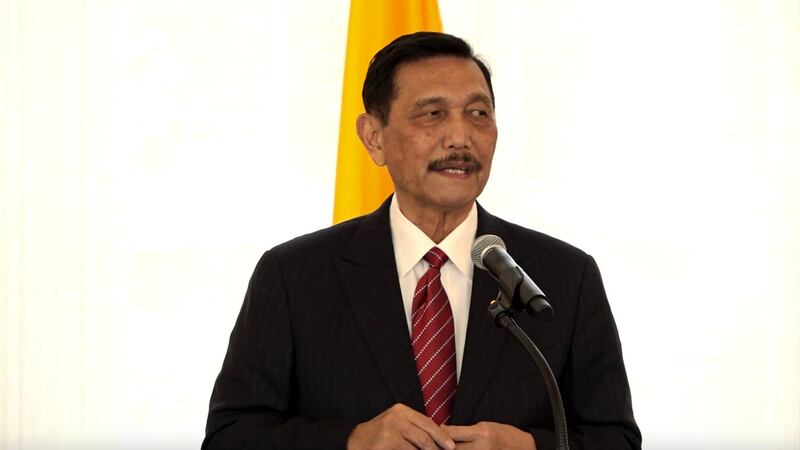A month and a half after a large Chinese survey vessel entered the Natuna Sea, Indonesia seems to still be pursuing a quiet, cautious approach at sea, despite public pressure.
Since Aug. 31, the Haiyang Dizhi 10 has been operating in the North Natuna Sea near an important oil and gas field, the Tuna Block. It did take a few days break to re-supply in late September, but returned to the location in early October.
Jakarta has been playing down the presence of the Chinese ship, even after experts pointed out that the grid-like pattern it creates is typical of a maritime seabed survey. Domestic pressure has been building with some researchers, like Imam Prakoso from the Indonesia Ocean Justice Initiative, saying that it’s likely that the Haiyang Dizhi 10 has been “carrying out unlawful research activity.”
The Indonesian government needs to take “firm action,” Imam said in an interview with BenarNews, an RFA-affiliated online news service, when the Haiyang Dizhi 10 re-entered Indonesian exclusive economic zone (EEZ) on Oct. 5. “Do they have permission or not? If not, it’s clearly illegal because we have clear rules regarding scientific research activities at sea,” he said.
Yet this Monday, the Indonesian Coordinating Minister of Maritime and Investment Affairs Luhut Binsar Pandjaitan brushed aside Natuna Sea concerns.
“We respect freedom of navigation in Natuna Sea,” Luhut said at the Catholic University of America in Washington D.C., where he delivered a lecture entitled “The Role of Indonesia in a Global Setting.”
Indonesian officials have been insisting that the Chinese vessel has committed no violation and that all foreign ships are allowed to pass through the Natuna Sea.
“I think Indonesia is very carefully selective about how and when it reacts and responds to China's assertiveness, which I'd even call provocation, in the Natuna Sea,” said Huong Le Thu, a senior analyst at the Australian Strategic Policy Institute.
She said many Indonesian thinkers are confident they can deal with China through dialogue, and that that takes time. But she added that in the meantime, “China has been modernizing its military capability, reclaiming islands in the South China Sea and growing in ambition.”
“I don't think we have all the time like many in Jakarta would assume,” Huong said.
Nevertheless, some Indonesian experts believe that Jakarta has undertaken unpublicized but resolute efforts to defend its national interests in the Natuna Sea.
“The fact that Indonesian Navy and Bakamla (the Indonesian Maritime Security Agency) deploy warships and cutters to shadow Haiyang Dizhi shows (the) Indonesian position,” said Satya Pratama, a current senior government official and a former Bakamla captain.
"It does not have to resort to some affirmative action like ramming or such,” he told BenarNews.

Protest or not protest?
While Indonesia does not regard itself as party to the South China Sea dispute, which pits the sweeping claims of China against those of several of its neighbors, Beijing does claim historic rights to areas overlapping Indonesia's exclusive economic zone.
Satya conceded that “formal protest is the norm for cases like this. But I believe some in Indonesian government do not believe in megaphone diplomacy.”
Some other countries in the region like Malaysia have also preferred a quiet diplomacy when dealing with China’s assertiveness in the South China Sea.
But recently, Malaysia publicly protested against the operation of another Chinese survey vessel, the Da Yang Hao, in its EEZ and even summoned the Chinese ambassador in Kuala Lumpur.
The Da Yang Hao left Malaysia’s waters two weeks afterward. It is unclear whether the diplomatic protest played a decisive role. But Elina Noor, an expert at the D.C.-based Asia Society Policy Institute, said that “for symbolic and substantive reasons, it’s important for Malaysia to continue protesting these sorts of incursions regardless of immediate effect.”
She said it “signals growing impatience and concern from the Malaysian side about the increasing brazenness of China’s approach.”
However, Huong, the analyst at the Australian Strategic Policy Institute, thinks that as a non-claimant to the South China Sea, Indonesia holds a somewhat different position from claimants such as Malaysia, Vietnam and the Philippines, which “cannot afford what Indonesia is doing - a step back from ‘South China Sea’ and only focusing on ‘Natuna’”.
She said that Indonesia in recent years “has shown relatively more inward-looking tendencies” and is preoccupied with major domestic matters like decentralization of authority, ethnic and religious issues and COVID-19.
‘Brothers and sisters’
Luhut, who is also Indonesia's coordinator for cooperation with China, explained his country’s policy towards China in his appearance at Catholic University.
“All documents, all international laws are there – we just respect them,” he said. “We discuss with our contact partners in China, we agree to disagree in some areas but I think we’re able to manage so far,” he told the audience, adding that the tensions over there [in the South China Sea] are “not as bad as people think in the U.S.”
“We don’t feel that we have issues with China,” Luhut said about Indonesia’s maritime borders in the South China Sea.
When pressed about the reported harassment of Indonesian fishermen by Chinese coastguard ships in disputed waters, the coordinating minister said: “We talk [with the Chinese side] on the phone and say, hey, stay away from there!”
“It’s like with your brothers and sisters, sometimes you have problems but don’t make it into a big problem!” Luhut said.
From the minister’s response, Indonesian officials appear keen to preserve the status quo in the South China Sea for the moment. It’s also likely that the Haiyang Dizhi 10 will keep criss-crossing the Natuna Sea for a while yet.
